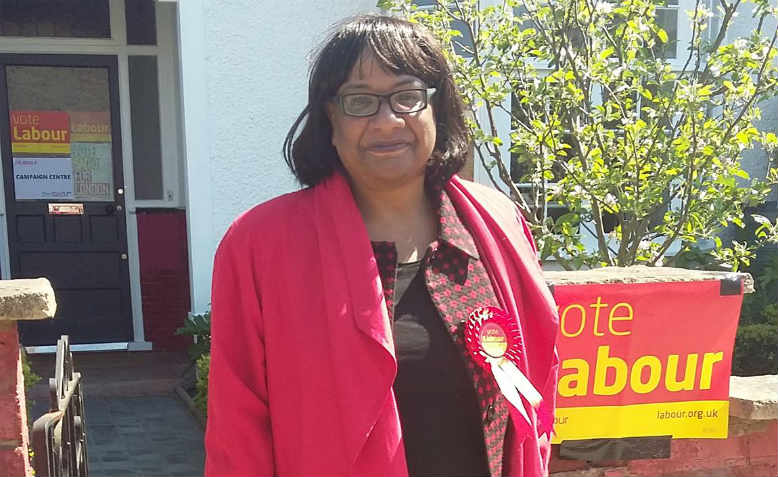 Diane Abbott campaigning in 2016. Photo: Facebook
Diane Abbott campaigning in 2016. Photo: Facebook
Is the interview with Diane Abbott really such big news, asks Lindsey German
We have had a series of events over the past two weeks which in any fair world would have seen the Tories pilloried. Last week they held a Scottish launch in a village hall so remote no one could broadcast from it. This week in Cornwall local press were locked in a room to prevent them from following May. The great strong and stable leader herself is increasingly robotic. The Tories have no answers to Brexit, the looming economic crisis, the housing disaster. They are rolling out universal credit in a way which is being described by those experiencing it as catastrophic.
Labour has had a good campaign so far. One poor interview (and I have to say from what I heard she just froze, nothing worse and not surprising after five previous interviews) and there’s hysteria. I was particularly nauseated by the omnipresent Alastair Campbell telling us that every politician should be well briefed. Like they were over the dodgy dossier before the Iraq war?
The truth is, everyone can be variable in how they do these interviews. Presenters like Nick Ferrari have a right-wing agenda and are good at skewering people. He can also be mightily unpleasant, as I know from personal experience. Spokespeople should obviously try to do their best and be well briefed, but sometimes it just doesn’t happen.
In 2015 Natalie Bennett of the Greens was similarly attacked for a poor interview, in a campaign where overall she acquitted herself well. Is it totally accidental that they are both women and that Diane Abbott is a high-profile black woman who has been subject to appalling racist attacks? Maybe, but this never happens to the awful Jeremy Hunt. The Tory party and public school arrogance still carries some politicians a long way.
It’s politically motivated stuff, and while Labour supporters are entitled to feel disappointed, I don’t really see why they join in with this chorus. It really isn’t important. Indeed, it might be pertinent to ask the Nick Ferraris of this world why they are so worried about costing when they are normally so keen on law and order. Perhaps it’s because they want to derail Labour on what is seen as a Tory issue?
Stop telling us we can’t vote Labour
I’m beginning to feel more than a little patronised by the progressive alliance people, who can’t believe the stupidity of all those who oppose the Tories and Ukip but refuse to give up our political allegiances in favour of the greater good, as defined by the Guardian.
Are there similarities between a range of the opposition parties? Of course. Are there also a number of sometimes important differences? Yes. This is particularly true when we consider Labour and the Lib Dems. The latter not only rushed into coalition with the Tories in 2010 (when they could have had an alliance with Labour) but Tim Farron has made it clear he would do it all again, while at the same time rejecting any such deal with Corbyn.
Those of us with long memories remember the scurrilous campaigning of some Lib Dems in strong Labour areas in the 70s and 80s. Why should we vote for a party we don’t agree with because some psephologists have worked out on paper that it’s in our interests to do so. The truth is that the only party which can form a government other than the Tories is Labour and that should be the goal of every socialist, however hard it looks.
Reform of the idiotic voting system in this country (and of parliament including the abolition of the House of Lords) are long overdue. But the middle of an election campaign is not the place to do it. Indeed, such attempts are only a means of weakening the Labour vote and therefore support for Corbyn.
Don’t knows are beginning to know after all
This is the case especially since the polls seem to suggest increased support for Corbyn (no you haven’t heard much about that on the BBC).
The amount of people who voted Labour in 2015 but now say that they don’t know how they will vote is falling, according to YouGov polls. When YouGov was showing those 20 point leads, around 20-25% of people who voted Labour in 2015 were saying they didn’t know what they would do at the election. In the last couple of polls that has dropped to 11%. Still a long way to go but a sign that Jeremy Corbyn is winning some arguments.

